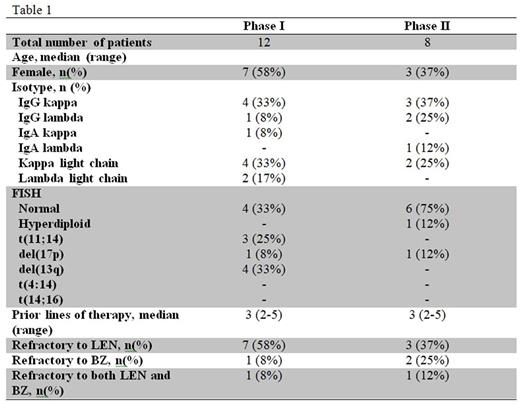Abstract
Introduction: Pomalidomide (POM)/dexamethasone (DEX) is an approved treatment for relapsed/refractory multiple myeloma (RRMM). A phase I study determined the maximum tolerated dose (MTD) to be POM 4 mg on days 1-21/28 days and DEX 40 mg weekly due to four drug related dose limiting toxicities (DLTs) of grade 3 and 4 neutropenia at POM 5 mg (Richardson et al. Blood. 2013 Mar 14; 121(11): 1961-1967). POM 4 mg improved ORR (30% vs 10%) and PFS (4 vs 1.9 months) of RRMM patients when compared to high dose DEX on a randomized phase III clinical trial (San Miguel et al, Lancet Oncol 2013; 14: 1055-66). We designed a study to find the MTD of POM when given with G-CSF support in an attempt to increase the dose and efficacy. We report the results of this study (registered in clinicaltrials.gov NCT01946152). Methods: The phase I followed a standard 3+3 design to determine the MTD. The phase II accrued additional patients at the MTD to determine preliminary efficacy with a target ORR of 45%. Both Phase I and II consisted of 6*28-day cycles of induction therapy (dose escalation POM up to 10 mg + G-CSF 5 mcg/kg on days 22-28 every 28 days and DEX 40 mg weekly) followed by a maintenance schedule (Cycle 7 onwards; POM 2 mg on days 1-21/28 days with DEX 40 mg weekly) given until progression or toxicity. MTD was defined as the highest dose that caused a DLT in less than 2 patients treated out of 6 patients. The maximum sample size was determined at 55 patients including up to 42 patients in the phase I and 13 patients at MTD in the phase II. The primary objective of the study was to determine the MTD of POM/DEX given with G-CSF support. The secondary objectives were ORR, PFS and further evaluation of safety at the MTD. Patients needed to have RRMM with measurable disease (serum M-protein ≥ 0.5 g/dL or urine BJ ≥ 200 mg/24 hours; light chain myeloma patients required an involved sFLC level ≥ 100 mg/L with an abnormal sFLC ratio). Patients must have received ≥ 2 cycles of lenalidomide (LEN) and bortezomib (BZ) (either in separate regimens or as part of the same regimen) and primary refractory or patients refractory to the most recent regimen were also eligible. Patients had to have received ≤ 5 lines of prior therapy. The distribution of time-to-event endpoints including progression free survival and overall survival were estimated using the method of Kaplan and Meier. Intent-to-treat analysis was applied for toxicity data. Results: From June 2014 until November 2016, twelve patients were enrolled in the phase I study and eight in phase II (Table 1). Three patients each were treated in the POM 4 mg and 5 mg cohorts, respectively, without DLTs. Dose was escalated to POM 6 mg and six patients were treated. Two patients had DLTs (one patient had febrile neutropenia and another patient grade 3 neutropenia). The MTD and phase II dosing was determined to be POM 5 mg + G-CSF 5 mcg/kg on days 22-28 every 28 days and DEX 40 mg weekly. ORR (≥ partial response) for the phase II portion is 62.5% (PR n=5/8 [62.5% and minor response (MR) n=3/8 [37.5%]). Accrual to the phase II portion of the study is ongoing. Overall, high dose POM was very well tolerated. For the entire study, Grade 3 related hematologic adverse events were thrombocytopenia (n=2; 10%), neutropenia (n=1, 5%) and febrile neutropenia (n=1; 5%). Grade 3 related non-hematological events were upper respiratory infection (n=1; 5%) and dyspnea (n=1; 5%). There were no grade 4 or 5 adverse events. At a median follow up of 22 months, median progression free survival (PFS) for patients on the study was 19.6 months and median survival time has not been reached. Conclusion: Pomalidomide can be safely administered at a dose of 5 mg if given with G-CSF support, providing an encouraging ORR of >60% in this cohort of patients with early relapse. Randomized studies are needed to determine the comparative efficacy with the current approved dose of 4 mg.
Manasanch: celgene: Consultancy; merck: Research Funding; sanofi: Research Funding; quest diagnostics: Research Funding; takeda: Consultancy; adaptive biotechnologies: Consultancy. Lee: Eutropics Pharmaceuticals: Research Funding; Adaptive: Membership on an entity's Board of Directors or advisory committees; Pimera Inc: Consultancy; Takeda: Consultancy; Daiichi Sankyo: Research Funding; Celgene: Consultancy. Patel: Pfizer: Membership on an entity's Board of Directors or advisory committees, Research Funding; Juno: Consultancy; Celgene: Consultancy. Lee: KITE PHARMA: Consultancy. Thomas: Bristol Myers Squibb: Research Funding; Celgene: Research Funding. Orlowski: BioTheryX: Consultancy, Membership on an entity's Board of Directors or advisory committees. Wang: Janssen: Consultancy, Honoraria, Membership on an entity's Board of Directors or advisory committees, Research Funding; Dava Oncology: Honoraria; Celgene: Honoraria, Research Funding; BeiGene: Research Funding; Kite Pharma: Research Funding; Pharmacyclics: Research Funding; June Therapeutics: Research Funding; Asana Biosciences: Research Funding; Acerta Pharma: Consultancy, Research Funding; Onyx: Research Funding; Proteolix: Honoraria, Research Funding.
Author notes
Asterisk with author names denotes non-ASH members.


This feature is available to Subscribers Only
Sign In or Create an Account Close Modal